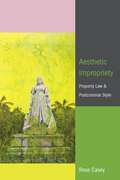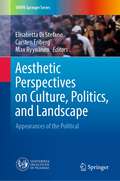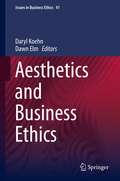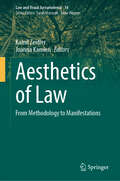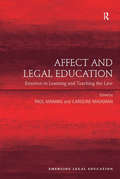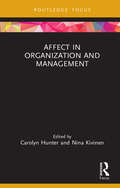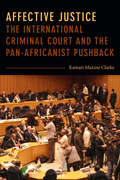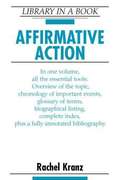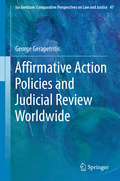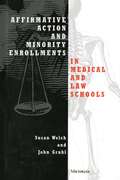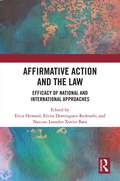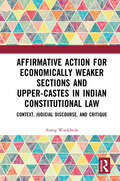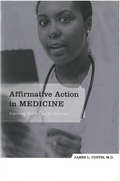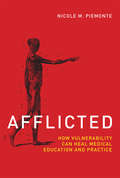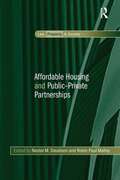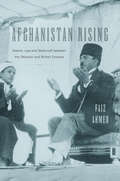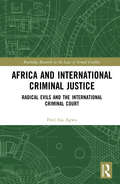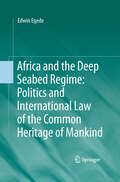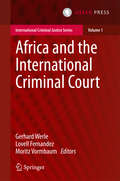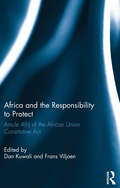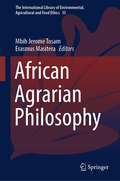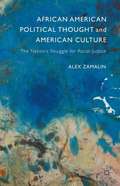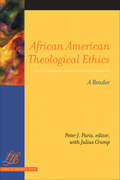- Table View
- List View
Aesthetic Impropriety: Property Law and Postcolonial Style
by Rose CaseyAcross Africa, Asia, and the Americas, colonial Britain’s property laws are in the process of being transformed. Aesthetic Impropriety analyzes vanguard legal actions and literary innovations to reveal contemporary reforms to property law that are undoing law’s colonial legacies. Casey traces precise legal histories across distinct jurisdictions throughout the anglophone world, revealing the connection between land law and petroleum extraction in the Niger Delta, inheritance and divorce laws and gender inequality in India, intellectual property law and Indigenous dispossession in South Africa, and admiralty law and racialized non-personhood in the English Atlantic. In response to these manifold forms of dispossession, significant reforms are underway, including through common law suits, statutory reform, and proposed changes to legal doctrine. Casey develops the concept of aesthetic impropriety to identify shared structures of thought across legal and literary venues. She shows that writers of poetry and prose are also transforming harmful property laws: in Nigeria, Ben Okri and Chigozie Obioma have articulated symbiotic ecological relationships that are also evidenced in recent actions against petroleum companies; in India, Arundhati Roy’s challenge to divorce laws has preempted similar attempts at reform in Parliament; in South Africa, Zoë Wicomb theorized protections for Indigenous modes of creative production nineteen years before they were signed into law; and in the Americas, M. NourbeSe Philip has proposed a novel method of achieving justice for the one hundred fifty enslaved people who were killed in the 1781 Zong massacre. Aesthetic Impropriety makes a convincing case for literature’s generative capacities and registers the enduring significance of the postcolonial as a necessary framework for understanding globalized inequality in the twenty-first century. By analyzing shared legal and aesthetic transformations, Aesthetic Impropriety argues that law and literature play vital roles in creating anticolonial world orders.
Aesthetic Perspectives on Culture, Politics, and Landscape: Appearances of the Political (UNIPA Springer Series)
by Max Ryynänen Elisabetta Di Stefano Carsten FribergThis book investigates how we are involved in politically informed structures and how they appear to us. Following different approaches in contemporary aesthetics and cultural philosophy, such as everyday aesthetics, atmosphere and aestheticization, the contributions explore how embedded powers in politics, education, democracy, and landscape are analyzed through aesthetics.
Aesthetics and Business Ethics (Issues in Business Ethics #41)
by Daryl Koehn Dawn ElmLudwig Wittgenstein famously said, "Ethics is aesthetics." It is unclear what such a claim might mean and whether it is true. This book explores contentious issues arising at the interface of ethics and aesthetics. The contributions reflect on the status of aesthetic en ethical judgments, the relation of aesthetic beauty and ethical goodness and art and character development. The book further considers the potential role art could play in ethical analysis and in the classroom and explores in what respects aesthetics and ethics might be intertwined and even mutually supportive.
Aesthetics of Law: From Methodology to Manifestations (Law and Visual Jurisprudence #14)
by Kamil Zeidler Joanna KamieńThe aesthetics of law deals with the relationship between law and beauty by searching for aesthetic values in the law itself (an internal perspective), by finding material related to law in art and culture (an external perspective), and, lastly, by demonstrating the impact of legal norms on what can be broadly understood as beauty (law as a tool of aestheticization). Regarding all these phenomena, the aesthetics of law ultimately allows us to see the law more clearly and more profoundly. What is more, the law does not function, nor has it ever functioned, separately from its means of expression, which are incontrovertibly subject to aesthetic interpretation. If we think about law in this way, perceiving not only the message, but also the manner in which it is conveyed, the whole set of means and tools used, the perfection and beauty of the form, then we will see art in it. After all, the widely known and still applicable ancient maxim ius est ars boni et aequi equates law and art. This alone should be an argument for aesthetic reflection on the law, a field of endeavour that should never have been abandoned. The book’s twenty-three chapters, written by scholars from various countries and three continents, are thematically diverse. In them we present the manifestations of the aesthetics of law from an external perspective. If we accept a definition of the concept of law that is as broad as possible, not only as a synonym of a certain formalized normative system, but also including the process of its creation (legislation), its application and interpretation (jurisprudence), and even teaching on and research into it (doctrine), we can identify a wealth of aesthetic references in the law. A broadly understood aesthetics of law, approached solely from an external perspective, covers such disciplines as law and literature, the aesthetics of legal rhetoric, the trial as performance, the aesthetics ofcourthouse architecture, law in the fine arts, law in film, law and music, pictorial law, symbols of the law and legal symbols, symbols of the state and power, legal archaeology etc. The field of research is, therefore, wide. In addition to topics traditionally and obviously associated with the aesthetics of law, such as law and literature, law in the fine arts, and court rhetoric, there are chapters on e.g. legal ethics and trademarks. All authors share the belief that beauty in law is important, even when it is hidden in a caricature. Further, they argue for restoring the aesthetics of law to its proper place in philosophical and legal discourse, as doing so would yield a host of benefits for the addressees of law.
Affect and Legal Education: Emotion in Learning and Teaching the Law (Emerging Legal Education)
by Caroline Maughan Paul MahargThe place of emotion in legal education is rarely discussed or analysed, and we do not have to seek far for the reasons. The difficulty of interdisciplinary research, the technicisation of legal education itself, the view that affect is irrational and antithetical to core western ideals of rationality - all this has made the subject of emotion in legal education invisible. Yet the educational literature on emotion proves how essential it is to student learning and to the professional lives of teachers. This text, the first full-length book study of the subject, seeks to make emotion a central topic of research for legal educators, and restore the power of emotion in our teaching and learning. Part 1 focuses on the contribution that neuroscience can make to legal learning, a theme that is carried through other chapters in the book. Part 2 explores the role of emotion in the working lives of academics and clinical staff, while Part 3 analyses the ways in which emotion can be used in learning and teaching. The book, interdisciplinary and wide-ranging in its reference, breaks new ground in its analysis of the educational lifeworld of situations, communities, actors and interactions in legal education.
Affect in Organization and Management (Routledge Focus on Women Writers in Organization Studies)
by Carolyn Hunter Nina KivinenAffect in Organization and Management asks how affect theory understands everyday working lives through embodied, social and political practice. Discussing a range of dimensions and perspectives on affect, the book considers how subjects are formed through their connections with others, both human and non- or more-than-human. The six women writers on affect presented in this series (Sara Ahmed, Kathleen Stewart, Donna Haraway, Jane Bennett, Karen Barad and Rosalyn Diprose) all speak to important themes in organization studies, including power, politics and ethics. Each chapter explores how these thinkers have already influenced organization scholars, as well as how their work can extend our understanding of pressing organizational issues around gender, race, the environment, leadership and ethics. Feminism is a core feature of this collection, highlighting feminist writing with affective, connected and intersubjective possibilities. Each woman writer is introduced by experts on affect and organization studies. The chapters also suggest further reading and accessible resources. The book is suitable for students, academics and practitioners in business and management, organization studies and critical management studies who want to think differently about organizations.
Affective Justice: The International Criminal Court and the Pan-Africanist Pushback
by Kamari Maxine ClarkeSince its inception in 2001, the International Criminal Court (ICC) has been met with resistance by various African states and their leaders, who see the court as a new iteration of colonial violence and control. In Affective Justice Kamari Maxine Clarke explores the African Union's pushback against the ICC in order to theorize affect's role in shaping forms of justice in the contemporary period. Drawing on fieldwork in The Hague, the African Union in Addis Ababa, sites of postelection violence in Kenya, and Boko Haram's circuits in Northern Nigeria, Clarke formulates the concept of affective justice—an emotional response to competing interpretations of justice—to trace how affect becomes manifest in judicial practices. By detailing the effects of the ICC&’s all-African indictments, she outlines how affective responses to these call into question the "objectivity" of the ICC&’s mission to protect those victimized by violence and prosecute perpetrators of those crimes. In analyzing the effects of such cases, Clarke provides a fuller theorization of how people articulate what justice is and the mechanisms through which they do so.
Affirmative Action
by Rachel KranzOne of the most controversial political issues of the past three decades has been the question of affirmative action. The phrase was first used in 1965 when President Lyndon B. Johnson issued Executive Order 11246.
Affirmative Action Policies and Judicial Review Worldwide (Ius Gentium: Comparative Perspectives on Law and Justice #47)
by George GerapetritisThis book discusses affirmative action or positive discrimination, defined as measures awarding privileges to certain groups that have historically suffered discrimination or have been underrepresented in specific social sectors. The book's underlying rationale is that one cannot place at the same starting point people who have been treated differently in the past because in this way one merely perpetuates a state of difference and, in turn, social gaps are exaggerated and social cohesion is endangered. Starting out with an introduction on the meaning and typology of affirmative action policies, the book goes on to emphasise the interaction of affirmative action with traditional values of liberal state, such as equality, meritocracy, democracy, justice, liberalism and socialism. It reveals the affirmative action goals from a legal and sociological point of view, examining the remedial, cultural, societal, pedagogical and economy purposes of such action. After applying an institutional narrative of the implementation of affirmative action worldwide, the book explains the jurisprudence on the issue through syntheses and antitheses of structural and material variables, such as the institutional recognition of the policies, the domains of their implementation and their beneficiaries. The book eventually makes an analytical impact assessment following the implementation of affirmative action plans and the judicial response, especially in relation to the conventional human rights doctrine, by establishing a liaison between affirmative action and social and group rights. . The book applies a multi-disciplinary and comparative methodology in order to assess the ethical standing of affirmative action policies, the public interests involved and their effectiveness towards actual equality. In the light of the above analysis, the monograph explains the arguments considering affirmative action as a theology for substantive equality and the arguments treating this policy as anathema for liberalism. A universal discussion currently at its peak.
Affirmative Action and Minority Enrollments in Medical and Law Schools
by Susan Welch John GruhlAffirmative action is one of the central issues of American politics today, and admission to colleges and universities has been at the center of the debate. While this issue has been discussed for years, there is very little real data on the impact of affirmative action programs on admissions to institutions of higher learning. Susan Welch and John Gruhl in this groundbreaking study look at the impact on admissions of policies developed in the wake of the United States Supreme Court's landmark 1978 Bakke decision. In Bakke, the Court legitimized the use of race as one of several factors that could be considered in admissions decisions, while forbidding the use of quotas. Opponents of affirmative action claim that because of the Bakke decision thousands of less-qualified minorities have been granted admission in preference to more qualified white students; proponents claim that without the affirmative action policies articulated in Bakke, minorities would not have made the gains they have made in higher education. Based on a survey of admissions officers for law and medical schools and national enrollment data, the authors give us the first analysis of the real impact of the Bakke decision and affirmative action programs on enrollments in medical and law schools. Admission to medical schools and law schools is much sought after and is highly competitive. In examining admissions patterns to these schools the authors are able to identify the effects of affirmative action programs and the Bakke decision in what may be the most challenging case. This book will appeal to scholars of race and gender in political science, sociology and education as well as those interested in the study of affirmative action policies. Susan Welch is Dean of the College of Liberal Arts and Professor of Political Science, Pennsylvania State University. John Gruhl is Professor of Political Science, University of Nebraska-Lincoln.
Affirmative Action and the Law: Efficacy of National and International Approaches
by Erica Howard Elvira Dominguez-Redondo Narciso Leandro Xavier BaezAffirmative Action and the Law analyses the practical application of affirmative action measures and their efficacy in achieving substantive equality through the lenses of the United Nations human rights machinery and the legal regime and policies implemented in China, India, Central and South America, South Africa and the United Kingdom. The product of a joint research project involving academics from the Brazil, Chile, Mexico, India, Spain and the United Kingdom, the findings identify and reflect on trends emerging from State practice across the world in eradicating structural inequality through special measures for certain designated groups. The book seeks to provide a coherent and systematic approach to the analysis of special measures in the targeted countries. It also comprises two case-studies with in-depth insights on gender diversity on the boards of public listed companies in the UK and the European Union and the access of persons with disabilities to higher education in Brazil. The book will be a valuable resource for students and academics in the field of human rights, law, sociology and politics. It will also provide a source of good practice for states and policy makers in the framing of responses to increased inequality at national and international level; and for civil society actors seeking to explore meaningful interaction with a highly controversial topic in society.
Affirmative Action for Economically Weaker Sections and Upper-Castes in Indian Constitutional Law: Context, Judicial Discourse, and Critique
by Asang WankhedeThis book examines the controversial 103rd Constitutional Amendment to the Indian Constitution that introduced an income and asset ownership-based new constitutional standard for determining backwardness marking a significant shift in the government’s social and public policy. It also analyses state level policies towards backwardness recognition of upper-caste dominant groups through case studies of Maharashtra, Haryana, and Gujarat. It provides an analytical and descriptive account of the proliferation of reservation policy in India and critiques these interventions to assess their implication on constitutional jurisprudence. Further, it assesses the theoretical and empirical challenges such developments pose to the principle of substantive equality and scope of affirmative action policies in Indian constitutional law and general discrimination law theory. The monograph shows how opening up of reservations for dominant upper-caste groups and general category will have implications for the constitutional commitment to addressing deeply entrenched marginalisation emanating from the traditional social hierarchy and the understanding of substantive equality in Indian Constitutional law. Further, it highlights key contradictions, incoherence, and internal tension in the design of the reservations for Economically Weaker Sections Critical, comprehensive, and cogently argued, this book will contribute and shape ongoing constitutional policy and judicial debates. It will be of great interest to scholars and researchers of law, Indian politics, affirmative action, social policy, and public policy.
Affirmative Action in Medicine: Improving Health Care for Everyone
by James L. CurtisAffirmative action programs have significantly changed American medicine for the better, not only in medical school admissions and access to postgraduate training but also in bringing a higher quality of health care to all people. James L. Curtis approaches this important transition from historical, statistical, and personal perspectives. He tells how over the course of his medical education and career as a psychiatrist and professor--often as the first or only African American in his cohort--the status of minorities in the medical professions grew from a tiny percentage to a far more equitable representation of the American population. Advancing arguments from his earlier book, Blacks, Medical Schools, and Society, Curtis evaluates the outcomes of affirmative action efforts over the past thirty years. He describes formidable barriers to minority access to medical-education opportunities and the resulting problems faced by minority patients in receiving medical treatment. His progress report includes a review of two thousand minority students admitted to U. S. medical schools in 1969, following them through graduation and their careers, comparing them with the careers of two thousand of their nonminority peers. These samples provide an important look at medical schools that, while heralding dramatic progress in physician education and training opportunity, indicates much room for further improvement. A basic hurdle continues to face African Americans and other minorities who are still confined to segregated neighborhoods and inferior school systems that stifle full scholastic development. Curtis urges us as a nation to develop all our human resources through an expansion of affirmative action programs, thus improving health care for everyone. James L. Curtis is Clinical Professor Emeritus of Psychiatry, Columbia University College of Physicians and Surgeons.
Afflicted: How Vulnerability Can Heal Medical Education and Practice (Basic Bioethics)
by Nicole M. PiemonteHow medical education and practice can move beyond a narrow focus on biological intervention to recognize the lived experiences of illness, suffering, and death.In Afflicted, Nicole Piemonte examines the preoccupation in medicine with cure over care, arguing that the traditional focus on biological intervention keeps medicine from addressing the complex realities of patient suffering. Although many have pointed to the lack of compassion and empathy in medical practice, few have considered the deeper philosophical, psychological, and ontological reasons for it. Piemonte fills that gap, examining why it is that clinicians and medical trainees largely evade issues of vulnerability and mortality and, doing so, offer patients compromised care. She argues that contemporary medical pedagogy and epistemology are not only shaped by the human tendency to flee from the reality of death and suffering but also perpetuate it. The root of the problem, she writes, is the educational and institutional culture that promotes reductionist understandings of care, illness, and suffering but avoids any authentic confrontation with human suffering and the fear and self-doubt that can come with that confrontation. Through a philosophical analysis of the patient-practitioner encounter, Piemonte argues that the doctor, in escaping from authentic engagement with a patient who is suffering, in fact “escapes from herself.”Piemonte explores the epistemology and pedagogy of medicine, examines its focus on calculative or technical thinking, and considers how “clinical detachment” diminishes physicians. She suggests ways that educators might cultivate the capacity for authentic patient care and proposes specific curricular changes to help students expand their moral imaginations.
Affordable Housing and Public-Private Partnerships (Law, Property and Society)
by Nestor M. DavidsonWith distressing statistics about rising cost burdens, increasing foreclosure rates, rising unemployment, falling wages, and widespread homelessness, building affordable housing is one of our most pressing social policy problems. Affordable Housing and Public-Private Partnerships focuses attention on this critical need, as leading experts on affordable housing law and policy come together to address key issues of concern and to suggest appropriate responses for future action. Focusing in particular on how best to understand and implement the joint work of public and private actors in housing, this book considers the real estate aspects of affordable housing law and policy, access to housing, housing finance and affordability, land use, housing regulation and housing issues in a post-Katrina context. Filling a critical gap in the scholarly literature available, this book will be of particular interest to policy-makers, academics, lawyers and students of housing, land use, real estate, property, community development and urban planning
Affordable Housing in the United States
by Gregg Colburn Rebecca J WalterAffordable Housing in the United States addresses the issue of affordability of housing, or the lack thereof, going beyond conventional policy discussions to consider fundamental questions such as: What makes housing affordable and for whom is it affordable? What are the consequences of a lack of affordable housing? How is affordable housing created? And what steps can be taken to ensure all people have access to affordable housing?With the understanding that different households face different challenges, the book begins by breaking down the variables relevant to the study of affordable housing, including housing costs, household income, geographic location, and market forces, to help readers understand and quantify affordability at the individual and societal level. Part II examines the consequences of unaffordable housing, highlighting racial inequities in housing access and affordability, and multiple forms of housing precarity including eviction and homelessness. Part III explores the entities involved in providing affordable housing such as local and federal governments, regulatory agencies, non-profit organizations, and for-profit developers. In Part IV, case studies from US cities demonstrate the complex web of organizations, policies, and market conditions that influence housing affordability, revealing substantial regional variations in access and policy response. Part V proposes a future roadmap and outlines four potential states with radically different outcomes for the affordable housing system in the United States.An ideal book for graduate and undergraduate courses in economics, public policy, real estate finance and development, sociology, and urban planning, this title will also be of value to professionals and policymakers seeking to understand and improve housing affordability and access.
Afghanistan Rising: Islamic Law and Statecraft between the Ottoman and British Empires
by Faiz AhmedDebunking conventional narratives, Faiz Ahmed presents a vibrant account of the first Muslim-majority country to gain independence, codify its own laws, and ratify a constitution after the fall of the Ottoman Empire. Afghanistan, he shows, attracted thinkers eager to craft a modern state within the interpretive traditions of Islamic law and ethics.
Africa and International Criminal Justice: Radical Evils and the International Criminal Court (Routledge Research in the Law of Armed Conflict)
by Fred Aja AgwuThis book provides an overview of crimes under international law, radical evils, in a number of African states. This overview informs a critical analysis of the debates surrounding the African Union’s call for withdrawal from the International Criminal Court and proposes a way forward with a more pertinent role for the Court. The work critically analyzes the arguments around withdrawal from the ICC and the extension of the jurisdiction of the African Court into criminal matters. It is held that this was not intended in the spirit of complementarity as envisaged by the Rome Statute, and is subject to political calculation and manipulation by national governments. Recasting the ICC as a court of second instance would provide a stronger institutional and jurisdictional regime. The book will be a valuable resource for students, academics, and policymakers working in the areas of international humanitarian law, international criminal law, African studies, and genocide studies.
Africa and the Deep Seabed Regime: Politics And International Law Of The Common Heritage Of Mankind
by Edwin EgedeThis book seeks to fill a gap in the existing literature by examining the role of African States in the development and establishment of the regime of the deep seabed beyond national jurisdiction (the Area) and the concept of the Common Heritage of Mankind.
Africa and the ICC
by Clarke Kamari M. Knottnerus Abel S. De Volder EefjeAfrica and the ICC: Realities and Perceptions comprises contributions from prominent scholars of different disciplines including international law, political science, cultural anthropology, African history and media studies. This unique collection provides the reader with detailed insights into the interaction between the African Union and the International Criminal Court (ICC), but also looks further at the impact of the ICC at a societal level in African states and examines other justice mechanisms on a local and regional level in these countries. This investigation of the ICC's complicated relationship with Africa allows the reader to see that perceptions of justice are multilayered.
Africa and the International Criminal Court (International Criminal Justice Series #1)
by Gerhard Werle Lovell Fernandez Moritz VormbaumThe book deals with the controversial relationship between African states, represented by the African Union, and the International Criminal Court. This relationship started promisingly but has been in crisis in recent years. The overarching aim of the book is to analyze and discuss the achievements and shortcomings of interventions in Africa by the International Criminal Court as well as to develop proposals for cooperation between international courts, domestic courts outside Africa and courts within Africa. For this purpose, the book compiles contributions by practitioners of the International Criminal Court and by role players of the judiciary of African countries as well as by academic experts.
Africa and the Responsibility to Protect: Article 4(h) of the African Union Constitutive Act
by Dan Kuwali Frans ViljoenSituations of serious or massive violations of human rights are no longer purely of domestic concern, and sovereignty can no longer be an absolute shield for repressive governments in such circumstances. Based on this realization, the international community has recognized a responsibility to protect individuals in states where their governments are unable or unwilling to provide protection against the most serious violations. However, so far, only one intergovernmental organization, the African Union (AU), has explicitly made the right to intervene in a Member State part of its foundational text in Article 4(h) of its Constitutive Act. Although there have been cases of Article 4(h)-type interventions in Africa, the AU Assembly has not yet invoked Article 4(h) explicitly. This book brings together experts in the field to explore the potential application of Article 4(h), and the complexities that may explain its non-invocation so far. Although Article 4(h) is noble in purpose, its implementation faces several legal and policy challenges given that the use of force penetrates the principles of state sovereignty and non-intervention – the very cornerstones upon which the AU is founded. This book considers these issues, as well as the need to reconcile Article 4(h), in so far as it allows the AU to exercise military intervention to protect populations at risk of mass atrocities, with the provisions of the Charter of the United Nations. Drawing from the insights of law, political science, diplomacy and military strategy, the book offers a unique combination of multi-disciplinary expertise that harnesses the views of a diverse group of authors, focused on the legal, policy, and practical insights on the implementation of Article 4(h) and the responsibility to protect in Africa in order to provide concrete recommendations on how to end mass atrocities on the continent
African Agrarian Philosophy (The International Library of Environmental, Agricultural and Food Ethics #35)
by Erasmus Masitera Mbih Jerome TosamThis book critically explores indigenous sub-Saharan African agrarian thought. Indigenous African agrarian philosophy is an uncharted and largely overlooked area of study in the burgeoning fields of African philosophy and philosophy of nature. The book shows that wherever human beings have lived, they have been preoccupied with exploring ways to ensure the sustainable management of limited resources at their disposal, to attain to their basic needs: food, shelter, and security. The book also shows that agriculture and the way people relate with nature are an essential, but generally neglected, determinant of the emergence and orientation of all philosophical traditions. In traditional, pre-colonial African culture, it was difficult to separate agriculture from African relational ontology. Agriculture and the use of natural resources were at the centre of community life and influenced the social, political, economic, and spiritual worldviews of the people. In their contact with nature through agriculture, different beliefs, knowledge systems, norms, moral outlooks, cultural practices and institutions emerged and have been valorized to guide societies on how to sustainably manage the environment. As a way of life, then, agriculture was deeply connected with indigenous beliefs, values, and practices which transcended a wide range of issues related to ecological ethics, food ethics, religion, traditional medicine, political economy, social organisation, biological reproduction and species survival, indigenous knowledge, and property rights. This book will thus be a valuable resource for policy makers and researchers in diverse fields such as philosophy, geography, sociology, anthropology, and development studies.
African American Political Thought and American Culture: The Nation's Struggle For Racial Justice
by Alex ZamalinThis book demonstrates how certain African American writers radically re-envisioned core American ideals in order to make them serviceable for racial justice. Each writer's unprecedented reconstruction of key American values has the potential to energize American citizenship today.
African American Theological Ethics: A Reader
by Editor Peter J. Paris Julius CrumpThis volume in the Library of Theological Ethics series draws on writings from the early nineteenth through the late twentieth centuries to explore the intersection of black experience and Christian faith throughout the history of the United States. The first sections follow the many dimensions of the African American struggle with racism in this country: struggles against theories of white supremacy, against chattel slavery, and against racial segregation and discrimination. The latter sections turn to the black Christian vision of human flourishing, drawing on perspectives from the arts, religion, philosophy, ethics, and theology. It introduces students to major voices from African American Christianity, including Frederick Douglass, Richard Allen, W. E. B. DuBois, Marcus Garvey, Martin Luther King Jr., Bayard Rustin, Barbara Jordan, James H. Cone, and Jacqueline Grant. This is the essential resource for anyone who wishes to understand the role that Christian faith has played in the African American struggle for a more just society.
